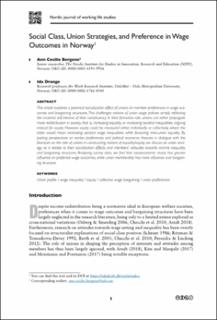Social Class, Union Strategies, and Preference in Wage Outcomes in Norway
Peer reviewed, Journal article
Published version
Permanent lenke
https://hdl.handle.net/11250/2758731Utgivelsesdato
2021-04-30Metadata
Vis full innførselSamlinger
Originalversjon
Nordic Journal of Working Life Studies. 2021, . https://doi.org/10.18291/njwls.126102Sammendrag
This article explores a potential socialization effect of unions on member preferences in wage out- comes and bargaining structures.This challenges notions of union wage policies simply reflecting the material self-interest of their constituency. In their formative role, unions can either propagate more redistribution in society, that is, increasing equality, or increasing societal inequalities, arguing instead for equity. However, equity could be measured either individually or collectively, where the latter would mean increasing societal wage inequalities while favouring intra-union equality. By putting perspectives on worker preferences and political economic theories in dialogue with the literature on the role of unions in constructing notions of equality/equity, we discuss on union strat- egy as it relates to their socialization effects and members’ attitudes towards income inequality and bargaining structures. Analysing survey data, we find that socioeconomic status has greater influence on preferred wage outcomes, while union membership has more influence over bargain- ing structure.

